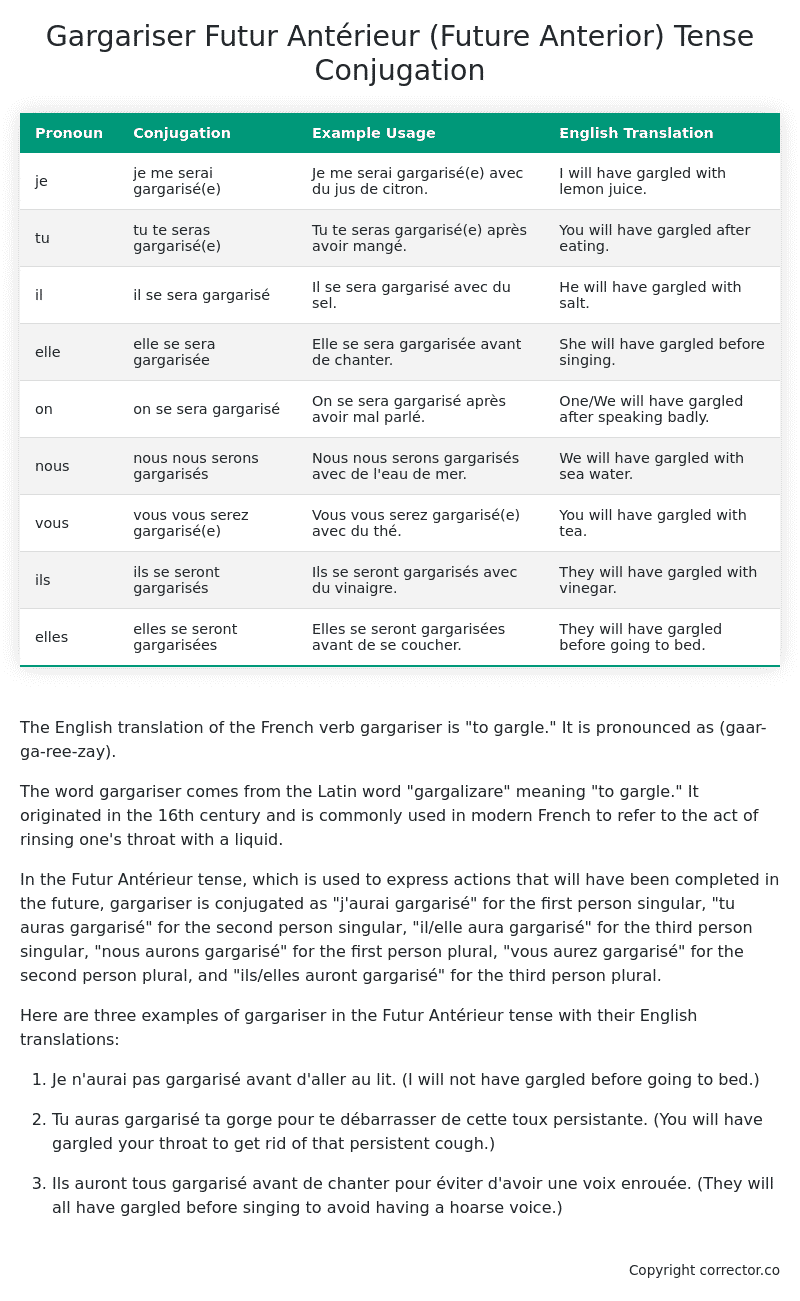Futur Antérieur (Future Anterior) Tense Conjugation of the French Verb gargariser
Introduction to the verb gargariser
The English translation of the French verb gargariser is “to gargle.” It is pronounced as (gaar-ga-ree-zay).
The word gargariser comes from the Latin word “gargalizare” meaning “to gargle.” It originated in the 16th century and is commonly used in modern French to refer to the act of rinsing one’s throat with a liquid.
In the Futur Antérieur tense, which is used to express actions that will have been completed in the future, gargariser is conjugated as “j’aurai gargarisé” for the first person singular, “tu auras gargarisé” for the second person singular, “il/elle aura gargarisé” for the third person singular, “nous aurons gargarisé” for the first person plural, “vous aurez gargarisé” for the second person plural, and “ils/elles auront gargarisé” for the third person plural.
Here are three examples of gargariser in the Futur Antérieur tense with their English translations:
-
Je n’aurai pas gargarisé avant d’aller au lit. (I will not have gargled before going to bed.)
-
Tu auras gargarisé ta gorge pour te débarrasser de cette toux persistante. (You will have gargled your throat to get rid of that persistent cough.)
-
Ils auront tous gargarisé avant de chanter pour éviter d’avoir une voix enrouée. (They will all have gargled before singing to avoid having a hoarse voice.)
Table of the Futur Antérieur (Future Anterior) Tense Conjugation of gargariser
| Pronoun | Conjugation | Example Usage | English Translation |
|---|---|---|---|
| je | je me serai gargarisé(e) | Je me serai gargarisé(e) avec du jus de citron. | I will have gargled with lemon juice. |
| tu | tu te seras gargarisé(e) | Tu te seras gargarisé(e) après avoir mangé. | You will have gargled after eating. |
| il | il se sera gargarisé | Il se sera gargarisé avec du sel. | He will have gargled with salt. |
| elle | elle se sera gargarisée | Elle se sera gargarisée avant de chanter. | She will have gargled before singing. |
| on | on se sera gargarisé | On se sera gargarisé après avoir mal parlé. | One/We will have gargled after speaking badly. |
| nous | nous nous serons gargarisés | Nous nous serons gargarisés avec de l’eau de mer. | We will have gargled with sea water. |
| vous | vous vous serez gargarisé(e) | Vous vous serez gargarisé(e) avec du thé. | You will have gargled with tea. |
| ils | ils se seront gargarisés | Ils se seront gargarisés avec du vinaigre. | They will have gargled with vinegar. |
| elles | elles se seront gargarisées | Elles se seront gargarisées avant de se coucher. | They will have gargled before going to bed. |
Other Conjugations for Gargariser.
Le Present (Present Tense) Conjugation of the French Verb gargariser
Imparfait (Imperfect) Tense Conjugation of the French Verb gargariser
Passé Simple (Simple Past) Tense Conjugation of the French Verb gargariser
Passé Composé (Present Perfect) Tense Conjugation of the French Verb gargariser
Futur Simple (Simple Future) Tense Conjugation of the French Verb gargariser
Futur Proche (Near Future) Tense Conjugation of the French Verb gargariser
Plus-que-parfait (Pluperfect) Tense Conjugation of the French Verb gargariser
Passé Antérieur (Past Anterior) Tense Conjugation of the French Verb gargariser
Futur Antérieur (Future Anterior) Tense Conjugation of the French Verb gargariser (this article)
Subjonctif Présent (Subjunctive Present) Tense Conjugation of the French Verb gargariser
Subjonctif Passé (Subjunctive Past) Tense Conjugation of the French Verb gargariser
Subjonctif Imparfait (Subjunctive Imperfect) Tense Conjugation of the French Verb gargariser
Subjonctif Plus-que-parfait (Subjunctive Pluperfect) Tense Conjugation of the French Verb gargariser
Conditionnel Présent (Conditional Present) Tense Conjugation of the French Verb gargariser
Conditionnel Passé (Conditional Past) Tense Conjugation of the French Verb gargariser
L’impératif Présent (Imperative Present) Tense Conjugation of the French Verb gargariser
L’infinitif Présent (Infinitive Present) Tense Conjugation of the French Verb gargariser
Struggling with French verbs or the language in general? Why not use our free French Grammar Checker – no registration required!
Get a FREE Download Study Sheet of this Conjugation 🔥
Simply right click the image below, click “save image” and get your free reference for the gargariser Futur Antérieur tense conjugation!

Gargariser – About the French Futur Antérieur (Future Anterior) Tense
Construction
Common Everyday Usage Patterns
Interactions with Other Tenses
For example
Summary
I hope you enjoyed this article on the verb gargariser. Still in a learning mood? Check out another TOTALLY random French verb conjugation!


